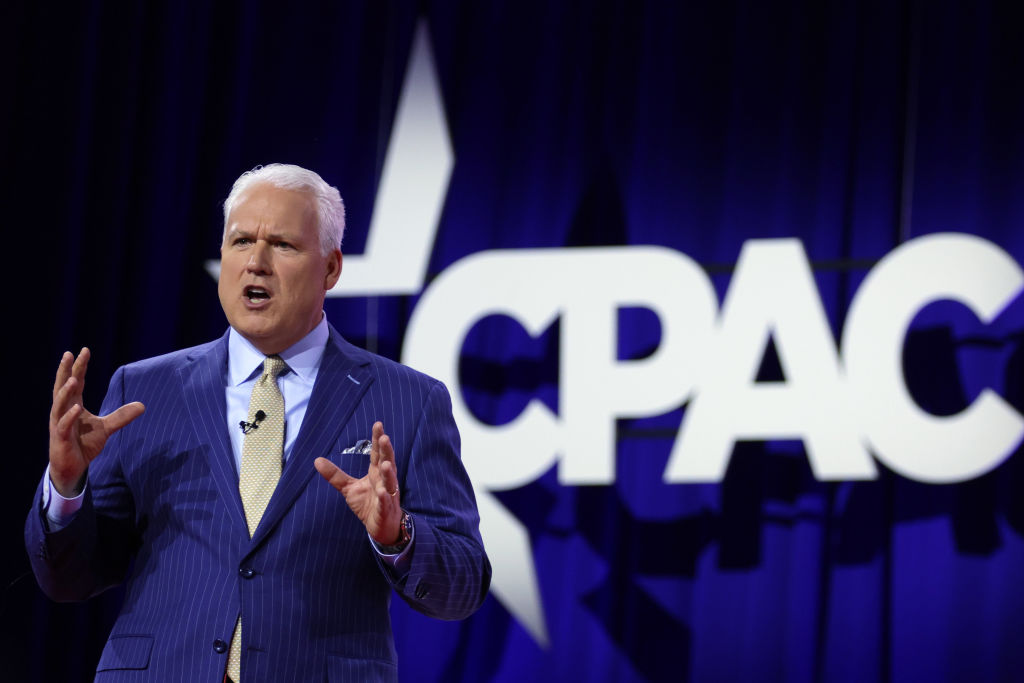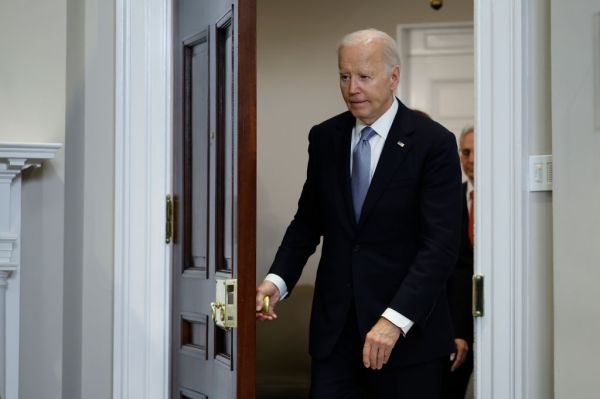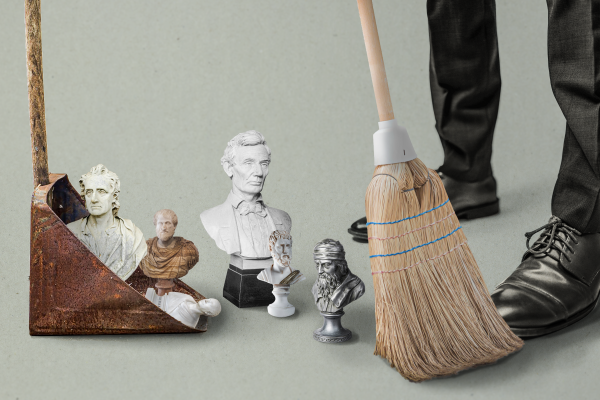Hey,
So, a lot of people didn’t like Friday’s G-File. I get it. Sometimes I indulge myself too much (“We figured that out from your physique”—the Couch). I’m not saying I’m going to stop indulging my writerly whims. Writing the G-File however I want is in my contract. But when I do decide to run free over the keyboard, I need to figure out a way to reliably tip off the reader that this is going to be one of those “it’s not the destination, it’s the journey” “news”letters so critics can’t say they weren’t warned.
Anyway, since you brought up the problem of indulgence, it’s worth pointing out that indulgence used to be primarily understood as something granted to you by others. From the etymological dictionary: “mid-14c., in the Church sense, ‘a freeing from temporal punishment for sin, remission from punishment for sin that remains due after absolution.’” Most people think of the ultimately corrupt practice of rich aristocrats buying a religious get-out-of-jail card from the church. And while that happened, the history and rationale of indulgences is actually a good deal more complicated. But don’t worry, I won’t repeat my errors of last week and dive into that rabbit hole.
I do think, however, that there’s something interesting to be said about the movement from the era of indulgence to the era of self-indulgence. I recently talked to Princeton’s Robert P. George on The Remnant. He argued that we’d gone from the Medieval Age of Faith to the Enlightenment Age of Reason to what we live in now: the Age of Feeling. We see our feelings as the final authority on countless fronts these days.
I discussed this at book length in Suicide of the West. I argued that giving ourselves over to human nature—our instincts, passions, emotions, feelings—is among the greatest sources of corruption in the classical sense. “Corruption,” I wrote, “isn’t about giving in to the seduction of bribery; it is about giving in to the seduction of human nature, the angry drumbeats of our primitive brains and the inner whispers of our feelings.”
The whole concept of self-indulgence fits neatly into this. People have always wanted to do bad things—that’s human nature—but in the Middle Ages you needed to get permission or forgiveness from someone else to make that okay. The church could give you an indulgence, you couldn’t give yourself one. But in an age where many of us are our own priests, we’ve cut out the middleman. When no one has the right to judge you, you can give yourself your own indulgence. Even in the worst cases of the church’s sales of indulgences, the sinner still had to pay a price. When the only legitimate authority is you, it’s pretty easy to lower or simply waive the “fee” for self-indulgence. In political philosophy, this is why you need the rule of law and checks on arbitrary power. As Edmund Burke insisted, no man can or should be a judge in his own cause.
Of course, you still have to get right with your own conscience. But a lot of people seem to think that a good conscience is something you’re just born with. Traditionally, this is one of the great distinctions between conservatism and radicalism. Note that I didn’t say “conservatism and progressivism” or “conservatism and liberalism” or “between left and right.” The distinction I have in mind is more a religious or philosophical one than a political one (though politics is profoundly influenced by which side you come down on). The conservative I have in mind here can be a political liberal or an arch reactionary. We’re talking about a theory of human nature. The conservative says that civilizing people requires a team effort. And the collective project of civilization is shaping our individual consciences. The catechism of the Catholic Church says:
Conscience must be informed and moral judgment enlightened. A well-formed conscience is upright and truthful. It formulates its judgments according to reason, in conformity with the true good willed by the wisdom of the Creator. The education of conscience is indispensable for human beings who are subjected to negative influences and tempted by sin to prefer their own judgment and to reject authoritative teachings.
You don’t have to be Catholic to understand the larger point. While I am no expert on any of this, I think I’m on safe footing when I say that Judaism has a similar conception to conscience. It’s just that until relatively recently—i.e. the medieval period—conscience (matzpun in Hebrew) could be described as doing what God would want you to do. And what God wants you to do is laid out in the Torah and other texts.
Again, as I wrote in Suicide of the West, “The greatest check on the natural human desire to give in to your feelings and do what feels good or even what feels ‘right’ can be captured in a single phrase: ‘God-fearing.’ The notion that God is watching you even when others are not is probably the most powerful civilizing force in all of human history.”
Anyway, the point here is that conscience isn’t something you’re born with, it’s something you develop in consultation with others—parents, pastors, and other people, living and dead—in this thing called “society.”
This is what I mean by the “conservative” view of human nature. The radical view, most commonly and reliably ascribed to Jean-Jacques Rousseau, is that humans are born good and are made bad by society and the oppressive institutions and rules of so-called “civilization.” This is as pithy a summation of the philosophical foundations of radicalism as you can find. Radicals start from the assumption that the existing order is corrupt and not worth saving. And there is a hell of a lot of radicalism on the right these days.
In his invaluable book, A Conflict of Visions, Thomas Sowell argued that these two views can be called the “constrained”—human nature is fixed and in need of civilizing—and the “unconstrained”—human nature and society are perfectible. He calls the practitioners of the unconstrained vision “the self-anointed.”
And, I would add, self-anointment—being your own ultimate moral authority—is a necessary precondition for unrestrained self-indulgence.
The right’s rot.
I’ve been a bit of a broken record of late about how I think much of the right has surrendered to the philosophical and psychological commitments of the left. Populism, long considered at best a dangerous if sometimes necessary tool, is now seen not as a means to a desirable end but an end unto itself. Under Critical Trump Theory, any laws, customs, rules, institutions, or facts that inconvenience, impugn, or indict Trump are immediately assumed to be corrupt and illegitimate. Fiscal restraint, popular when a Democrat is in the White House, is for suckers when one isn’t. Sexual restraint is a valuable concept only when your enemies lack it. When your heroes are equally lacking, it’s a sign you’re an alpha male or proof of your enemies’ double standards—or both.
Now, as a practical partisan matter, this is a little unfair—to the left. For all the receipts I have after more than a quarter-century of ideological battle with the left, it’s worth noting that there’s never been a celebration of lawlessness or blindness to political, constitutional, or sexual depravity from mainstream Democrats like we’ve seen for the better part of a decade from many Republicans and right-wing “influencers.” I am fully willing—happy, even—to concede that the left made terrible arguments and committed various sins over the last couple generations. But that’s part of my point. Whataboutism isn’t a defense if you do the very things for which you condemn the other side. It’s as if the right took the worst aspects of what I detest about the left and said, “Okay, we can beat that. Watch this.”
When looking at the erosion of our political order, I don’t see a sharp break with Trump’s emergence on the scene, I see an increase in the rate of decay. This acceleration is made possible by the collective decision to make the worst aspects of politics and media bipartisan. Conservatism is supposed to be a source of constraint and restraint on populist passion and moral relativism. But we’ve replaced the brake with a second gas pedal.
It shouldn’t surprise anyone that the left is bad at promoting constitutional norms and political restraint—they’ve had so little practice making such arguments. Still, where the left merely argued for a “living Constitution” that breathed new meaning into it, we have people on the right arguing for just scrapping the whole thing entirely because it is a hindrance to their will to power. This is true of the propellor-beanie eggheads pining for a “post-liberal” America, and of the GOP presidential frontrunner, who—after failing to scale the constitutional hurdles to steal an election—called for the “termination of all rules, regulations, and articles, even those found in the Constitution” in order to put him back in power.
I’ll spare you a reprisal of the credible accusations—some corroborated by Trump’s own words on tape—of Donald Trump’s sexual self-indulgence. I’ll forgo reciting the litany of shady business schemes and misdeeds and the soaking of donors for his personal aggrandizement. Instead, just look at the characters in his orbit, and I don’t just mean Roger Stone, Steve Bannon, and James O’Keefe.
Jerry Falwell Jr., once made a fortune off claiming the mantle of a Christian warrior. After it was revealed he and his wife (and her pool boy) had more pagan tastes, he insisted that he shouldn’t be held to such a standard just because people think he’s religious. “Because of my last name, people think I’m a religious person,” he told Vanity Fair. “But I’m not.” I don’t know, maybe people thought that because he spent years passing himself as crusader fighting against the war on Christianity and soliciting donations to that effect?
Rudy Giuliani is being sued by his former assistant, who is claiming he essentially used her as a full-time sex slave. “I want to own you, officially,” he is alleged to have said on tape, according to transcripts submitted in court. “I’m gonna make it a little painful.”
Matt Schlapp, the head of the Conservative Political Action Conference (CPAC), is under siege for his self-indulgent spending and for—how should we put this—allegedly acting like a blind man trying to read the pages of the Braille version of Josh Hawley’s book, which just happened to be in the pants of various young men. We don’t know if the allegations—both about the sexual assaults and the financial impropriety—are true, but I’d bet they are. More dismaying is how so few people on the Trumpist right care that they might be true.
Anyway, you get the point. These are people who have liberated themselves from traditional conceptions of conscience. Not all of them are self-indulgent on matters of sex or money, but a great many have imbibed the idea that they are not truly answerable to conventional or traditional notions of morality or political restraint. For this crowd, the outrage of January 6 is the harshness of the penalties the goons received, not the assaults on cops or the defecating in the halls of Congress. Mike Pence is a villain for defending the Constitution and being upset that a mob sought to hang him. After all, as a banner proclaimed at CPAC in Dallas last year, “We Are All Domestic Terrorists.” If you can’t smell the radicalism, even discounting for poetic license and dumb rationalizations, you’ve gone nose-deaf to it.
Even those who are undoubtedly relatively decent people in their private lives are desperate to provide rhetorical cover for indecency in others. Former Arkansas Gov. Mike Huckabee may be an upstanding Christian at home, but as a political player, his application of Christian scolding is entirely mercenary—and his politics appear more informed by Critical Trump Theory than by scripture. Just this week, for example, he proclaimed that if Trump’s legal problems prevent him from winning the presidency, 2024 will mark “the last American election that will be decided by ballots rather than bullets.” We hear a lot about how Trump deserves the presumption of innocence and his day in court. Well, that cuts both ways. If you start from the conclusion that any guilty verdict is illegitimate—so illegitimate that it will justify mass violence—you’ve made up your mind regardless of the evidence.
Yuval Levin often argues that cynicism is seen as a form of political sophistication—the very opposite of being naive—when in reality it’s just another form of naiveté. The assumption that everyone is just in it for themselves—that crass materialistic concerns drive human actions—is a simplistic way of looking at life, politics, and human nature.
Schlapp’s wife invited a great deal of mockery when she recently declared on “Twitter” that the “Daily Beast is Satan’s publication to persecute Christians and their families.” Matt Schlapp followed up by saying, “Soon to start a weekend edition: the Saturday Satan.” I am open to the idea that they genuinely believe this. After all, when staffers resigned in protest last year, the Schlapps organized an exorcism to banish their Satanic residue from the office. Now, you can believe that this is all part of their larger grift and committing to the part. But I don’t. I think they sincerely believe—incorrectly, in my view—that they are fighting Satan.
But that’s the point. Being self-anointed, being your own priest, doesn’t mean you will become homo economicus. The Bolsheviks subscribed to the unconstrained vision of human nature. That didn’t make Bolsheviks into purely profit-maximizing creatures. It made them zealots. This was G.K. Chesterton’s point about how people who cease to believe in God won’t believe in nothing—they’ll believe in anything. Today’s radical zealotry on the right stems from the belief—often sincerely, not cynically, held—that they need to fight back against Americans who are already at war with them. And the only pathway to victory comes with unrestrained power, which just so happens to be what so many of them want. It’s all so convenient, self-indulgent, and … radical.
I’m not making an argument for religiosity here. By any objective metric, the Schlapps are more religious than I am. What I am saying is that restraint, informed by good conscience, is among the most conservative of virtues. And restraint is a meaningless term unless it restrains you from acting on your raw, self-indulgent, desires.









Please note that we at The Dispatch hold ourselves, our work, and our commenters to a higher standard than other places on the internet. We welcome comments that foster genuine debate or discussion—including comments critical of us or our work—but responses that include ad hominem attacks on fellow Dispatch members or are intended to stoke fear and anger may be moderated.